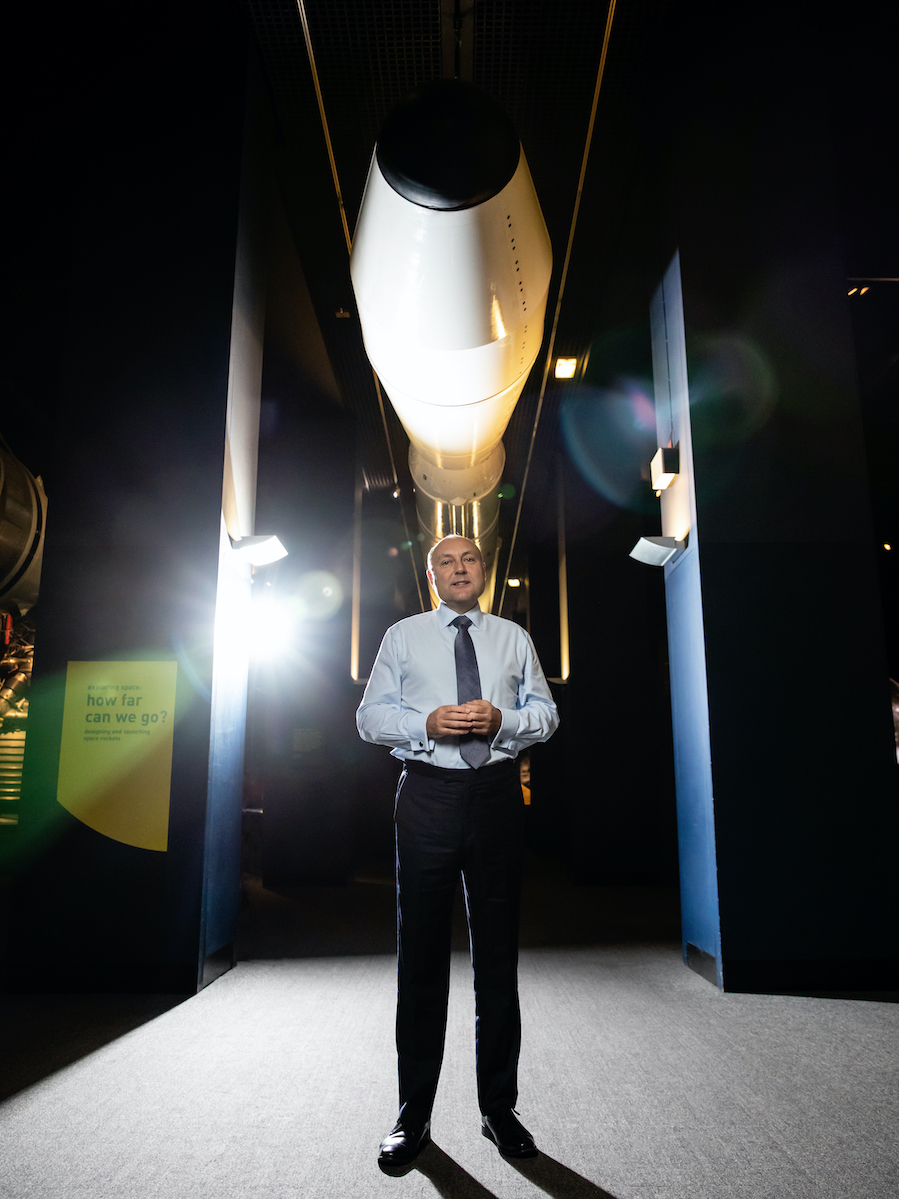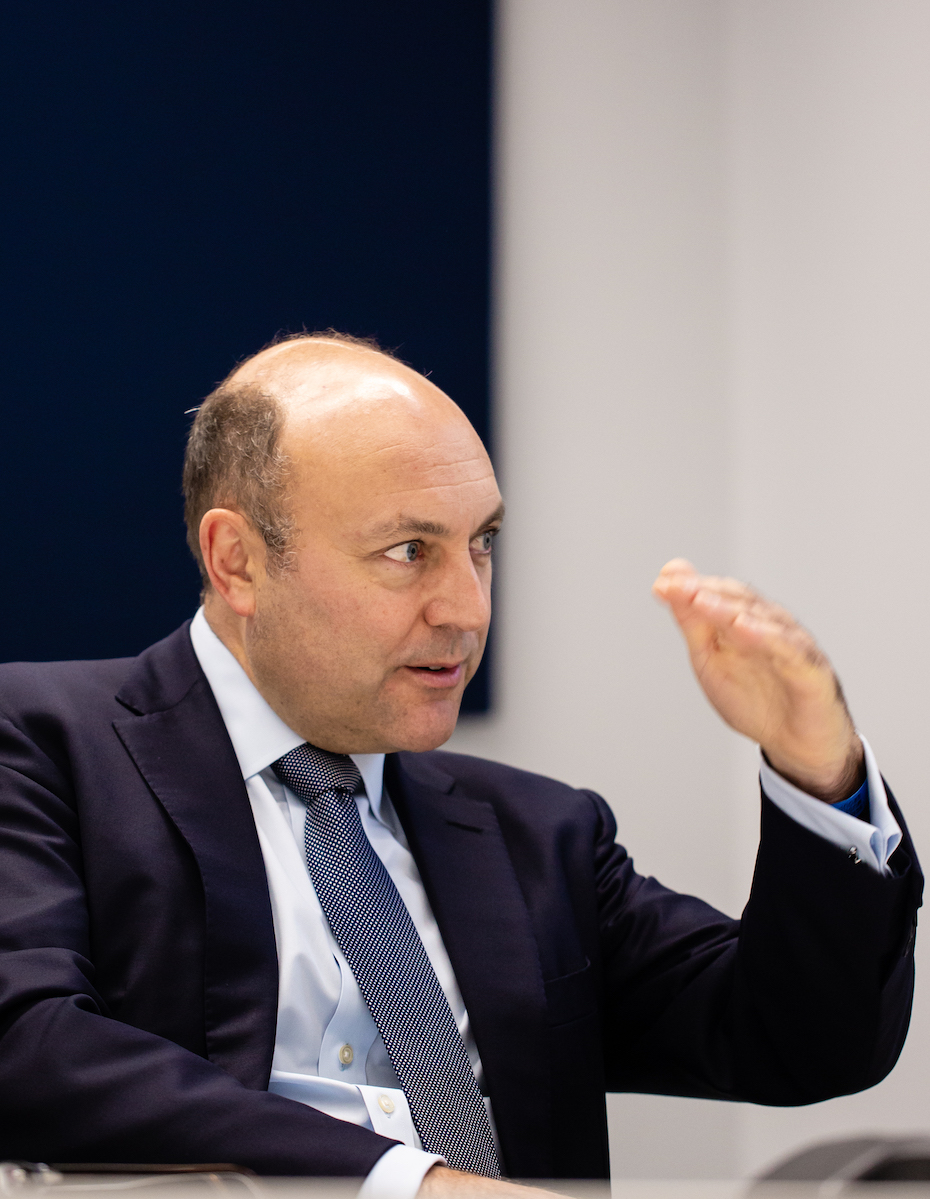The Andrew Griffith interview: "Would I want to be the first minister in space?"
9 min read
Britain is punching well above its weight in space, Andrew Griffith tells Tali Fraser, but it needs private capital to realise its full potential. Photography by Louise Haywood-Schiefer
“The UK is a great spacefaring nation,” declares Andrew Griffith. “We’re one of about half a dozen countries in the world that have got real credibility in space.”
Given the space minister is speaking a year after a failed debut for the Cornwall spaceport and at least a year before the inaugural launch from the Shetland site, it’s a bold claim.
But the former investment banker, 52, does not want for belief, even if his grasp of some of the finer details of what lies beyond our atmosphere is less certain.
The MP for Arundel and South Downs is the first to acknowledge he is learning on the job as space minister after only recently being appointed. “I’m not an encyclopaedia,” he says.
So much is clear when he points to the suspended sphere in the Science Museum that switches appearance from planet to planet and declares “now we have got Mars!” only for an employee to gently tell him it is, in fact, the Sun. Undeterred, Griffith exclaims “that one is Saturn!” as the planet changes. The employee interjects: “No, no, that is Jupiter”.
The minister is on safer ground when he explains the collective effort required by space exploration and his role in ensuring that the United Kingdom remains relevant. He adds: “The one thing you know about human endeavour, and if you think about the number of people who were working on the Apollo mission, half a million people or something at its peak, these are not acts of individual heroism. They’re about what my background is all about, which is getting the best out of a big team of people.
“There’s no question in my mind that when we think about what it will take to colonise Mars, if that’s humanity’s goal, then you’re going to need a lot of the British research and innovation that we’re funding right now.”
 Space minister Andrew Griffith at the Science Museum. Photography by Louise Haywood-Schiefer
Space minister Andrew Griffith at the Science Museum. Photography by Louise Haywood-Schiefer
At the moment, that endeavour is being led by Elon Musk. How comfortable should we be relying on a weed-smoking entrepreneur who can supposedly switch off his satellite system to prevent a Ukrainian drone attack against Russia playing such a fundamental role in the push to reach Mars?
The minister for space doesn’t really answer the question, instead emphasising the government’s dedication to “protect the people and protect the strategic interests of the UK” through the country’s “sovereign capabilities in space”.
This could one day see us “build a base on the moon” and “colonise other planets”, Griffith says. Grand plans considering the space minister then dampens the idea of a Brit walking on the moon by 2025, despite the American space agency NASA telling the science secretary Michelle Donelan it was “incredibly possible” a British person could appear on the upcoming Artemis III mission (since delayed by a year) to the moon. Donelan herself has said that it was “only a matter of time until we get a British person on the Moon”.
Even so, Griffith says: “I don’t think we’re planning on putting a Brit on the moon in 2025.”
He adds: “We’re not sending Tim Peake to the moon, we’re sending him back to the International Space Station. I hope that doesn’t come as bad news to Tim but I think that’s a mistake. I think that’s a misunderstanding or misspeak.”
Peake has been outspoken about his ambition to become the first British person to walk on the moon, so may not be delighted to hear the space minister’s comments.
I think having things like a space strategy gives people a long-term roadmap so they understand what we’re doing as a government
But Griffith is instead focusing his attentions on the future British-led or all-British mission back to the International Space Station and the UK’s potential to lead in the satellite industry.
The space minister adds: “We really punch above our weight in certain categories. Things like the creation of satellites. That’s an acknowledged capability of the UK.”
Before entering Parliament in the 2019 election, having also worked as an investment banker at Rothschild, Griffith was chief financial and chief operating officer at Sky.
“I’m probably the first minister with responsibility for space, who has themselves signed off the launch of a constellation of satellites,” he says, “because Sky itself went and procured a fleet of Astra satellites.”
While he was at Sky, it was reported that – in a personal capacity – Griffith lent his £9.5m Grade II-listed Westminster townhouse out as Boris Johnson’s campaign HQ after the ousting of Theresa May in 2019. “Everyone has always gotten this wrong,” Griffith says, “it was just the transition so it was after the campaign, and it was a few days before he and the team moved into No 10.” Griffith would later become head of Johnson’s policy unit.
The townhouse is now up for sale. “What I’m looking to do is downsize. One thing I’m not looking to do is leave Parliament, it’s not that, but it’s too big for my needs,” he adds.
Griffith has held ministerial jobs under the last three prime ministers: “We’re hoping that that’s a recognition of a degree of quiet competence.” It is the experience from his most recent role as city minister that he wants to bring into his job at DSIT.
“How do we crowd in private capital alongside the substantial public capital we’re putting in? I think the classic things will be raising awareness. It’s a category that people need to understand,” he says.
“I think having things like a space strategy, which the UK didn’t have until recently, gives people a long-term roadmap so they understand what we’re doing as a government.”
Part of the government’s space strategy includes a venture capital (VC) framework, which will help investors engage with a novel emerging market. It’s an area in which he believes he can have a real impact: “It’s a good bridge between the work I was doing in the City, with getting more capital for our brilliant space companies.”

Within that, he is ensuring the VC framework is rebranded, and broadened, to help it to attract a wider range of private investment. “We are still working on the details,” he says.
Griffith says one in £8 of private investment in space is already being spent in the UK and, after the United States, it is the second highest destination for private investment: “That is pretty good.”
“I would say UK PLC is open for launch,” the former City minister adds, “and we look forward to hearing customers’ plans in 2024”.
But in March last year, senior figures at the Welsh company Space Forge, which lost a satellite when Virgin Orbit’s Start Me Up mission failed to reach orbit, told the science and technology select committee that the UK was now seen as “toxic” for satellite launches – and should consider redirecting funding to hospitals.
Patrick McCall, a non-executive director at Space Forge, said: “The CAA is taking a different approach to risk, and a bit to process and timing as well. But I think unless there is, without wanting to be too dramatic, a seismic change in that approach, the UK is not going to be competitive from a launch perspective.”
“I suspect that was probably quite a contemporaneous reaction to watching what is one of the clear fundamental risks,” Griffith says of Space Forge’s comments.
I think having things like a space strategy gives people a long-term roadmap so they understand what we’re doing as a government
He defends the Civil Aviation Authority (CAA) and regulatory processes, which have come under attack for being “not competitive”.
“We’ve been through that learning curve,” Griffith insists. But even Sir Stephen Hillier, chairman of the CAA, said last year that there are issues with the “multifarious agencies” that companies are required to engage with for launch approval. He told the science and technology committee: “If it’s difficult for us, as the Civil Aviation Authority, to make all those connections with other aviation authorities around the launch area… then it’s even more so for commercial entities and is very much so for small, medium enterprises, and it might put them off that process.”
Griffith hits back at this idea, branding it “with respect, a bit backward-looking” – and says that during 2023, partly in response to issues like the failed Virgin Orbit launch, regulatory processes have been tightened up.
“These are novel processes, a little bit like when you licence a vaccine. The first time you do it, there’s a novelty to it. But then you’ve gone over that learning curve. You’ve climbed that mountain. You understand what needs to be done. It becomes increasingly repetitive and simple and faster from here on. Parliament has now legislated for this in a way that it had not before, so things like licencing multiple satellites on the same launch vehicle, that’s now much easier. They’re not treated as each individual launches, they can be treated as a single cluster or constellation.”
But Griffith admits that it has not resolved the regulatory issues, and brands the UK only a “near one-stop-shop” for getting into orbit: “The word ‘near’ is important, but we are a near one-stop-shop for all of the different regulatory processes.”
 Andrew Griffith during his interview with The House. Photography by Louise Haywood-Schiefer
Andrew Griffith during his interview with The House. Photography by Louise Haywood-Schiefer
Although changes to the regulation “took a while”, he says that it is in the context of “uncertainty whenever you’re launching up into orbit”.
What about the minister’s own stratospheric ambitions? “Would I want to be the first minister in space?” he asks himself.
“I think the whole idea of space exploration is fascinating. It’s enormously good that people like Tim Peake and others do that, but I’m very respectful of the amount of proficiency that goes into that.”
Griffith would not pay to go up into the stratosphere – “that’s for other people” – and even bats away the idea of making the journey at a time when the average man could go up: “It feels like quite a long way out of reach at the moment.”
